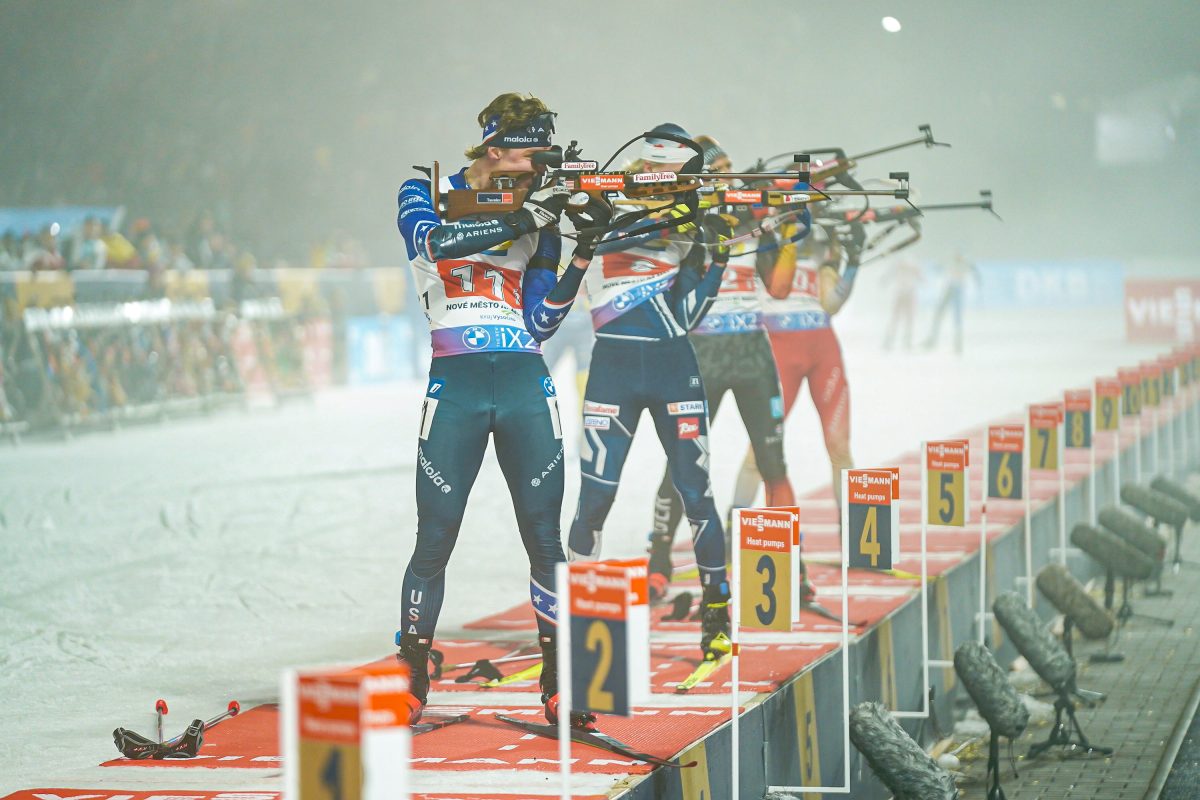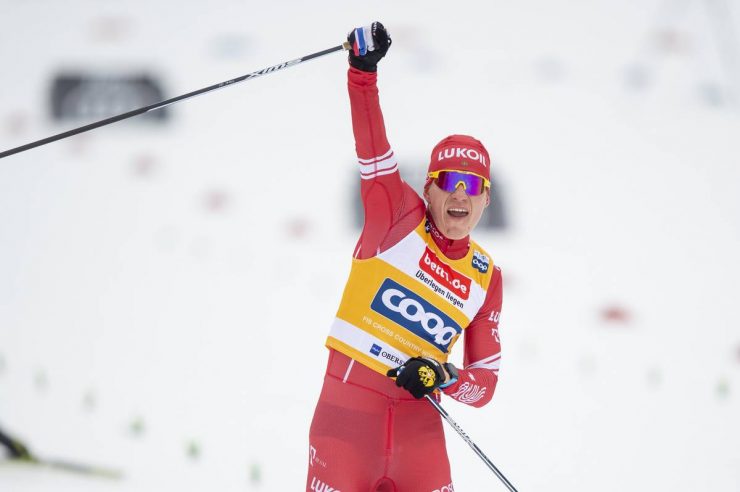
This is the first part of a three-part series on Russia’s Alexander Bolshunov. You can find part two here.
At 24 years old, Alexander Alexandrovich Bolshunov has become arguably the best men’s skier in the world. He has already secured this season’s World Cup title, to go along with his 2020 Overall Crystal Globe. He has a handful of Olympic and World Championship medals—all silver. At the Oberstdorf World Championships, his least favorite venue in the world, he aims to correct that and beat his Norwegian rivals in open competition. Elena Välbe, the head of Russian skiing, has said that a gold medal at the World Championships is his greatest dream.
It’s a goal Bolshunov has chosen not to state publicly. Something of an enigma, Bolshunov avoids interviews and keeps his dreams mostly to himself. His competitors have compared him to a machine, his detractors to a deranged hooligan. He’s been called the most hated man in cross-country skiing. To Russian ski fans he’s a virtuous hero: quiet, hard-working, humble, and serious – a patriotic poster boy. Retired Russian skier Alexander Legkov has compared his discipline to that of a monk. Then there is the lighter side of Bolshunov. Markus Cramer, a coach for Russia, says that privately he is quite funny. His fiancé sees a kind and gentle person. Bolshunov, for his part, describes himself as a soft simpleton.
“Why do I need cross-country skiing?” Bolshunov has said according to a translation. “First, I love this sport. Secondly, there are unrealized goals. Thirdly, there is a person whom I want to overtake.”
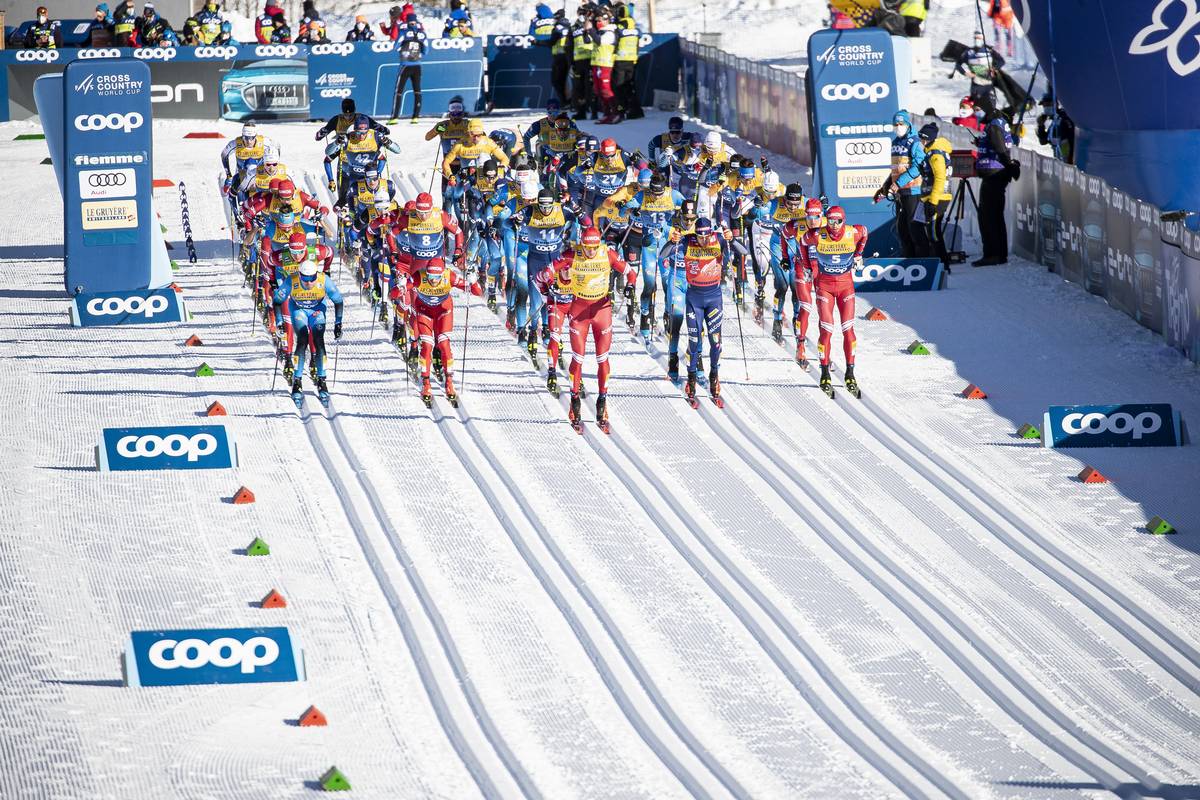
The Early Years
On New Year’s Day 1996, Bolshunov was born in the small town of Podyvot’ye. Little more than a collection of houses surrounded by fields and forests, Podyvot’ye lies just a few kilometers east of the Ukrainian border.
His father farmed and ran a sawmill out of their barn; his mother worked in forestry. Alexander, who is generally called by the diminutive Sasha or Sanya, became accustomed to the physical labor of both field and mill. He still enjoys the work when he goes home. “It does good to my head,” he says. For fun, he hunted mushrooms, fished, and skied.
Skiing began as a fun family activity for the Bolshunovs, but Sasha quickly became hyper-competitive. “My dad began to train me, after which we decided to run a competition, where I won and I had a great desire to become the best and achieve great goals,” He recounted on his Instagram. A week later he was slower in his time trial. “I was very upset, to tears…for me at that moment there was no difference that the skis were worse and the weather was completely different. And after such moments, you understand that the main task is to beat, overcome yourself, become better than yesterday.”
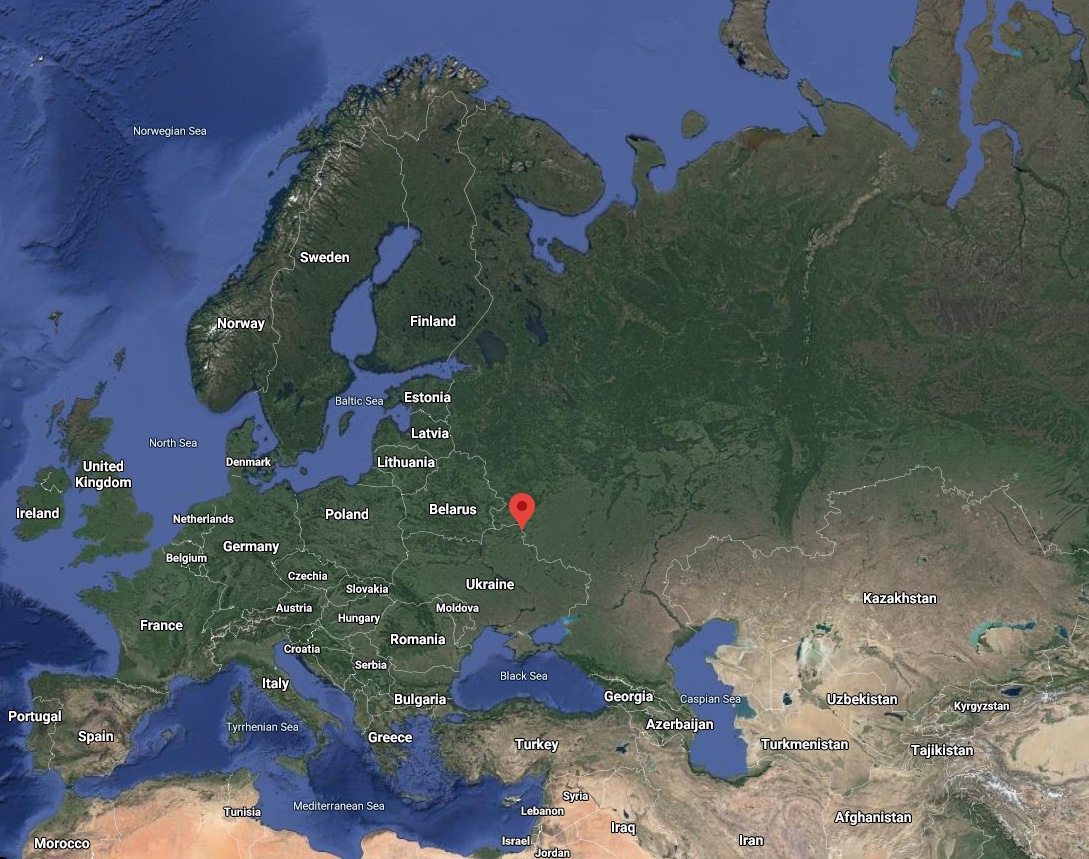
His father started to coach the young Bolshunov to be a competitor, using his tractor to cut his own ski trails and bringing him to local races. By Bolshunov Sr.’s account, that was one of his goals for Sasha’s life: to make him a great skier.
His father had, in his own time, tried to make it as a successful skier but was unable to reach a level of acclaim. He used his knowledge to create a training regimen that was anything but mellow. After school, Sasha would work on the farm or in the mill. His “real workout” was often not until eight or nine at night, when the work was done.
He would ski daily on the homemade trail outside their home with his father, usually classic skiing and avoiding the nearby Ukrainian border where it was illegal to ski. In the summer, Bolshunov’s father would store snow in the family barn and haul it out for a short-lived ski
According to Bolshunov, he has never fully adjusted to life outside Podyvot’ye, describing himself as a country boy at heart. “I can’t stand city life,” he has said. “It takes all my strength.” Adding, “I just want to be home.”
Eventually, his father realized his son would need more than his hand-cut trails in the fields of Podyvot’ye to become a world-class skier, and Bolshunov would have to leave his village to get an education, either on skis or otherwise.
In ninth grade, Bolshunov had to make a pivotal choice about his future: to pursue the life of a ski racer or an education for a professional career. For Bolshunov, the choice was already made. Ever since he had learned that the 2014 Olympics would be held in Sochi, he dreamed of representing Russia on home snow. Although Bolshunov would be just seventeen years old during the Sochi Games, he judged it was enough time to get to an Olympic level.
In 2011, shortly after Bolshunov had turned fourteen, his parents enrolled him in the ski academy in Bryansk, a city of more than 400,000 that lies 165 kilometers to the north of Bolshunov’s village. There he would work with esteemed coach Nikolai Nekhritov, the first-team coach of the academy.
“By that time he was already quite good on skis,” recalled Nekhritov. “He was just a child, but he ran under the first [junior] category.”
Small for his age, Bolshunov took time to develop and lagged behind his peers at the Bryansk academy in terms of results. His races were decent but not exceptional. Still, Bolshunov was competing as a junior, against skiers three or four years older.
He competed in his first FIS race in November 2012 at an Eastern Europe Cup 10km race held in Vershina Tyoi, 200 kilometers north of Mongolia. He was 15 years old and finished in 188th place. A month later he raced in juniors and finished 107th. In that race, he competed against his current teammate Alexei Chervotkin, who was 16 at the time. Chervotkin beat Bolshunov by more than two and a half minutes.
Nevertheless, Nekhritov, his coach, maintained faith in his ability to perform in the future and looked after his long-term development. His father also continued to play an active role in coaching Bolshunov during his time in Bryansk.
By the following December of 2013, 16-year-old Bolshunov was finally seeing some progress. He finished 14th at a mid-December Juniors sprint race in Syktyvkar.
Two weeks later he turned seventeen and the results began to flow. That March he won the skiathlon event at the Russian National Junior Championship, outsprinting Chervotkin and Ivan Yakimushkin. It was a breakout event for Bolshunov, who won the pivotal race in a pair of borrowed boots. On the back of that notable performance, he was named to the Russian Junior Team and awarded an honorary Master of Sport.
The hard work Bolshunov had put in at the Bryansk academy paid off. As Nikita Kriukov, the famed former Russian sprinter, later recounted in an interview about Russian youth development: “Sasha Bolshunov never won a single extra medal in juniors. But thanks to his perseverance and certain abilities, which were created in him by the first coaches … A lot, as far as I know, was put into him by Nekhitrov, his Bryansk coach. The parents, of course, had a hand. All this has been transformed, and the person is now virtually invincible.”
The following winter Bolshunov was invited to compete for Russia at World Juniors in Almaty, Kazakhstan. His lone event was the classic sprint. He qualified in 4th but finished 11th. Johannes Høsflot Klæbo was third. It was their first encounter.
Around this time a new face soon arrived in Bolshunov’s training group: Anna Zherebyateva. They met at the medical examination before Anna’s first training camp, and Bolshunov was unusually chatty. He began to look after her in her first three training camps and though Anna didn’t think much of it at the time, he was interested. When she became sick during a camp in Belarus, Bolshunov took the chance to act. “On his day off he came to me with a huge sack of fruit,” recalled Zherebyateva. “One fruit I remember very well – watermelon. At that moment, oddly enough, I realized.” Things took off after that. “After I recovered, and even during the time when I was sick, we began to communicate and so everything started spinning.” They have been together ever since, and rarely apart, with national team groups spending 250 days a year together between races and camps. Last summer Bolshunov proposed.
In the winter of 2015/16, Bolshunov was a regular on the podium of Russian Junior races and competed at all the events at World Juniors in Rasnov, Romania. While he took silver with the Russian relay team, Bolshunov’s best individual race was 8th in the 15km freestyle. The star of World Juniors that year was Klæbo who won three gold medals. He even pipped Bolshunov in the 15km, finishing just three-tenths of a second in front of him. Klæbo’s stardom began in Rasnov, while Bolshunov was still trying to catch up to Spitsov and Yakimushkin.
In 2016 it was time for a change for the nineteen-year-old Bolshunov. He left Bryansk and signed a contract with the Tyumen region team, while also being a member of the junior national team.
The oil city of Tyumen in Central Russia was an apt move for Bolshunov. Skiing for a well-funded region is important, as the regions themselves pay the majority of a skier’s expenses and salary. Elena Välbe, current President of the Russian Cross Country Ski Association and Manager of the National Team, described the funding structure: “All overseas fees were fully funded by the regions. We pay…when necessary, but the athletes are completely on the shoulders of the regions. This is the situation…The federation’s own funds would be enough for a maximum of one training camp in the off-season.”
In addition, skiers often take positions in the police or military as another method of funding, similar to the path that many skiers take in Central Europe. Bolshunov joined the National Guard, in the Ural District, where he now holds the rank of lieutenant.
Tyumen was a logical choice for an ambitious skier. There was generous regional funding supported by the oil wealth and a new skiing complex, called the Pearl of Siberia, built to be a world-class venue to rival anything that Western Europe could offer.
Bolshunov’s entry into the national team coincided with the return of Yuri Borodavko to coaching. Borodavko, a long time national team coach for Russia, had been suspended for two years by Välbe in 2010 after his skier Evgeny Dementiev tested positive for EPO at the 2009 Tour de Ski.
The formerly banned coach was now nominally charged with the U23s, which included a promising group of young skiers, such as Bolshunov, Denis Spitsov, and Natalia Neprayeva.
Borodavko’s old-school training philosophy suited Bolshunov, who thrived in the environment. “Personally, in my work, I try not to deviate from the methodology that bore fruit back in Soviet times,” Borodavko said in an interview. “There are, of course, some adjustments due to the fact that a lot of time has passed since then, but the overall picture is the same.”
Borodavko’s group is known for their demanding regimen—the hardest of the four Russian national groups. Still, there may be an element of myth-making at work. Bolshunov has said that Borodavko’s reputation as a tyrannical coach doesn’t match reality. He considers him to be a typical ski coach.
By all accounts he trains a lot; 5 hour morning sessions are not out of the ordinary. Last spring he skied 135km in a single, continuous 6.5-hour session. “Here are all the conditions, everything that only his soul desires,” said Borodavko.
Legkov, who averaged around 12,000km a year in his training, has said that Bolshunov does twice as much as he did when he trained with Borodavko. Of course, this is an exaggeration, but it remains a distinct possibility that Bolshunov trains more hours than anyone else on the World Cup.
Legkov has commented on Bolshunov’s uniqueness, “like Usain Bolt, Phelps, [or] Bjørndalen.” He mused about his preternatural focus on racing. “He has his whole life there, there is nothing else,” Legkov said. “Just like a horse with blinders on its eyes, which only goes forward, because it does not have the ability to look around.”
Bolshunov described his own philosophy: “Training must bring suffering. This is a workout to achieve results. And if for pleasure – it’s not for us, it’s not for the national team. But you also need to force yourself in moderation. If you go through [with it] every day, then you will not live to see winter.”
For some of Borodavko’s skiers, the training was too much for their bodies to tolerate. For others, like Bolshunov, it was about to work wonders.
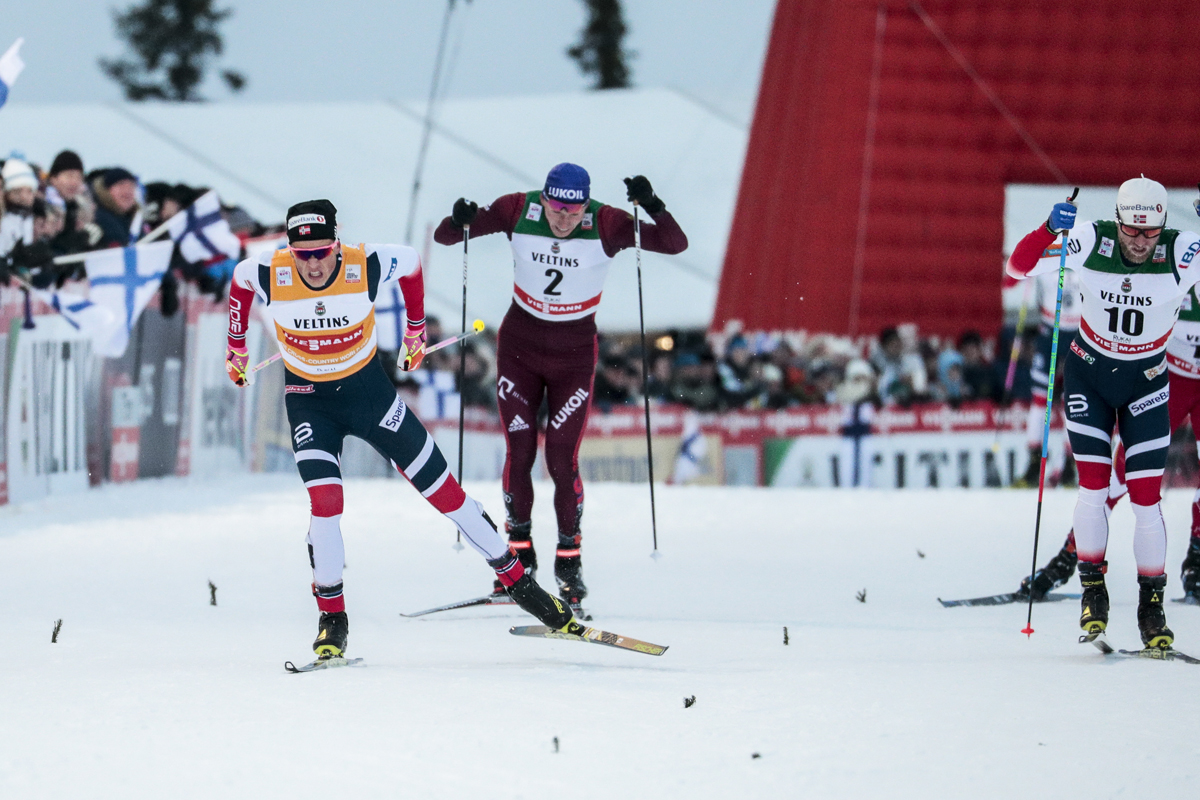
A Career Begins
In the winter of 2017, Bolshunov dominated Russian FIS races and came to the U23 World Championships in Soldier Hollow, Utah ready to win. There he captured two golds and a silver medal, matching Klæbo’s haul the previous winter. Yet what really caught public attention was the way the skiathlon ended. Bolshunov, and his teammates Chervotkin and Spitsov, finding themselves to be the only podium contenders, decided to cross the finish line arm in arm.
The race jury, after much review, ultimately declared Bolshunov the winner. Borodavko was not impressed. Asked later if he wanted to spank Spitsov, he said, “And not only him! All three…what they performed at the finish was a circus. Until now, if I start scolding them, I start like this: ‘Well clowns…’”
The young skiers looked ahead to the Olympic games the following year, but uncertainty and infighting reigned that winter after the McLaren report, outlining the systematic doping in Russian sport, was released in December 2016. With it came the provisional suspensions of six Russian skiers, including the well-known Alexander Legkov and Maxim Vylegzhanin.
That was the climate leading into PyeongChang, an Olympic games Russia was initially barred from attending. When it was announced certain Russian skiers would be allowed to compete, but without the Russian flag and national anthem, Bolshunov buried his head in his hands and questioned whether it was even worth competing at all. Intensely patriotic, Bolshunov has said he takes his personal motto from Putin’s slogan “No one in front”, meaning no one in front of Russia.
Bolshunov had only four career starts at the highest senior level as he headed into the Olympic season. At the 2017 Lahti World Championships, he notched his best result—8th.
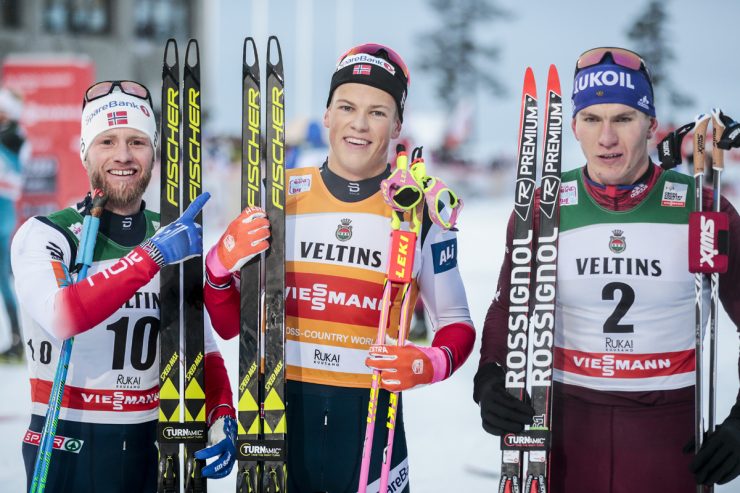
Martin Johnsrud Sundby (NOR) second, Johannes Hoesflot Klaebo (NOR) first, and Alexander Bolshunov (RUS) third. , (l-r) (Photo: Fischer/Nordic Focus)
In the 2017/18 season before the Games, he stood on the World Cup podium four times, each instance finishing third. He placed 6th at the Tour de Ski. The PyeongChang Olympics would be another turning point in his career: he took home three silver medals and a bronze.
His Olympic performance was big news in Russia and made all the more significant for the recent tribulations to the country’s sporting stature. When Bolshunov arrived back in Russia he received a hero’s welcome and was mobbed at the airport. His mother, who had been too nervous to watch the races on TV, pushed through the throng to hug him.
There was now a Russian rival to Klæbo’s ascendancy as the king of cross-country, and with it, an air of mutual wariness between the Norwegian and Russian camps emerged.
Pasha Kahn
Pasha Kahn writes and coaches in Duluth, Minnesota.



